A New Scenario has Challenged us to Renew our Programmes
 Following a predictable trajectory, the Ebola infection – starting in February 2015 – has begun the stage of its decline. The number of cases has been reduced to such an extent that this epidemic can be defined as being under control. This is the case despite an unexpected worsening of the infection that started in the month of March, a worsening which – although causing alarm – was not as virulent as the last months of 2014. The development of the epidemic can be monitored by following the official site of the local Ministry of Health (http://health.gov.sl/) which reports updated data every day. As a consequence of the reduced number of cases, the institutions and agencies entrusted with the segregation of suspected cases (HC: holding centres) and the treatment of confirmed cases (ETC: Ebola treatment units) began to empty. During the two months under consideration, the level of occupation of the available beds in the holding centres and the Ebola treatment units was around 12%. The evolution of the epidemic has involved on the part of the staff of the Camillian Task Force and the diocese of Makeni, which is a partner in the project, a rethinking of the programmes for prevention and those of a psycho-social character.
Following a predictable trajectory, the Ebola infection – starting in February 2015 – has begun the stage of its decline. The number of cases has been reduced to such an extent that this epidemic can be defined as being under control. This is the case despite an unexpected worsening of the infection that started in the month of March, a worsening which – although causing alarm – was not as virulent as the last months of 2014. The development of the epidemic can be monitored by following the official site of the local Ministry of Health (http://health.gov.sl/) which reports updated data every day. As a consequence of the reduced number of cases, the institutions and agencies entrusted with the segregation of suspected cases (HC: holding centres) and the treatment of confirmed cases (ETC: Ebola treatment units) began to empty. During the two months under consideration, the level of occupation of the available beds in the holding centres and the Ebola treatment units was around 12%. The evolution of the epidemic has involved on the part of the staff of the Camillian Task Force and the diocese of Makeni, which is a partner in the project, a rethinking of the programmes for prevention and those of a psycho-social character.
In practical terms, with Ebola being seen as a consequence of the defective health-care system and also the cause of a further weakening of that system, the objective of the programmes of prevention has been to strengthen the frail health-care sector of Sierra Leone – above all in the rural and remote areas – according to a strategic approach made up of the most important actors in the field, energised by the World Health Organisation and other international agencies. The rational motivation for this change in programme (previously activities were envisaged at a parish level that involved information and education directed specifically at the prevention of Ebola – involving the production of video and disseminating material as well – and the giving of contracts to nurses for a period of six months so as to be able to monitor the learning of information and people’s adherence to instructions) lies in the belief that the civic institutions – albeit with all their limitations – can assure continuity and sustainability for the programmes that have been set in motion which, in contrary fashion, would not last long if they were connected to temporary projects. In addition, the basic health-care service which serves the population,  in addition to stability ensures that the population as a whole can be reached because they are localised in remote areas which nobody has the courage to visit! The basic health-care services (primary health units – PHUs) provide substance to the commitment to provide ‘health for all’.
in addition to stability ensures that the population as a whole can be reached because they are localised in remote areas which nobody has the courage to visit! The basic health-care services (primary health units – PHUs) provide substance to the commitment to provide ‘health for all’.
As regards psycho-social activities which initially were focused on the instruction of a large number of figures such as priests and men and women religious, catechists, nurses, teachers and seminarians, albeit without a clear description of the implementation of these activities, the decision was made to reduce the number of participants and implement a programme directed at support for, and the rehabilitation of, the most vulnerable groups (based on two criteria: a daily income below 2 US$ and the number of Ebola orphans) which was to last nine months. For this reason, an initiative was planned involving the offer of assistance to four hundred family units chosen in twenty parishes of the diocese in the districts of Bombali, Kambia, Port Loko, Tonkilili and Koinadugu who would be accompanied by twenty community-based psycho-social facilitators (CBPSF) selected in each of the parishes involved. At the end of the programme (the end of December) the diocese will be able to rely upon twenty trained CBPSF with an intense programme sub-divided between a theoretical part (17 intensive days) and a practical part (9 months) with supervision assured by a local trainer qualified in mental health and two trainers of the Camillian pastoral centres of Madrid and Nairobi.
 Various rational motivations lie at the basis of this change. We may refer substantially to three principal ones. The first is the belief that a programme of formation, in order to be effective, needs suitable time; continuous monitoring; the possibility of testing theory through contact with practice; and suitable tests where the candidate engages in dialogue with the tutor. A programme planned for nine months with periods of testing and a tutor who is available can assure all of this. The second reason is the desire to ensure that formation will have a concrete effect on the lives of those who have experienced the drama of Ebola (and previously a civil war that lasted eleven years). A ‘laboratory’ formation in addition to being sterile is unfair if it is unable to reach the beneficiaries it has been conceived for. For this reason, the 400 family units can rely upon moral support (the emotional aspect) and humanitarian support (the social aspect) through conditional cash transfers (the literature on this subject is extensive. In our project the pre-conditions that are laid down are: the orphans must attend school and those who have survived Ebola must have regular check-ups); school support for the children; and other forms of economic help during the course of the monthly mutual-help sitting. To sum up: rather than short courses like rain showers, a solid intervention at the level of training for a narrow group (26 participants: in addition to the 20 indicated by the parishes, other places are for Congregations that work in the field of health and health care) which at the end of the course will be able to offer its services to the local diocese as a resource for the creation of an ongoing centre for counselling and listening.
Various rational motivations lie at the basis of this change. We may refer substantially to three principal ones. The first is the belief that a programme of formation, in order to be effective, needs suitable time; continuous monitoring; the possibility of testing theory through contact with practice; and suitable tests where the candidate engages in dialogue with the tutor. A programme planned for nine months with periods of testing and a tutor who is available can assure all of this. The second reason is the desire to ensure that formation will have a concrete effect on the lives of those who have experienced the drama of Ebola (and previously a civil war that lasted eleven years). A ‘laboratory’ formation in addition to being sterile is unfair if it is unable to reach the beneficiaries it has been conceived for. For this reason, the 400 family units can rely upon moral support (the emotional aspect) and humanitarian support (the social aspect) through conditional cash transfers (the literature on this subject is extensive. In our project the pre-conditions that are laid down are: the orphans must attend school and those who have survived Ebola must have regular check-ups); school support for the children; and other forms of economic help during the course of the monthly mutual-help sitting. To sum up: rather than short courses like rain showers, a solid intervention at the level of training for a narrow group (26 participants: in addition to the 20 indicated by the parishes, other places are for Congregations that work in the field of health and health care) which at the end of the course will be able to offer its services to the local diocese as a resource for the creation of an ongoing centre for counselling and listening.
The Style of Work: Within a System
The Camillian Task Force (CTF), together with the partners of the project which the Camillians have been implementing in the diocese of Makeni since December 2014, understood the need to work in close contact with those agencies which by their mandates are entrusted with health-care services for citizens. With these principles in mind, the Camillian Task Force made an agreement with the partners of the network which envisaged putting together resources to attain a shared objective. Respecting the various projects (research, strengthening of communities, prevention and the supply of material), a single shared objective emerged: to serve the victims of Ebola and transform this calamity into an opportunity for growth, strengthening the civic health institutions (the medical area) and offering psycho-social support (the psychological area). The plan was thus various programmes and various operational agencies (PHU and parishes) with a single recipient – the population of the twenty PHUs and the parishes of the diocese of Makeni. This union of resources allows a strengthening of activity, leaving to each party the responsibilities that come from its own project.
Activities and Actions
The aim of the research was understanding the role of anti-bodies in protection against EVD. A measurement of anti-bodies in people who have survived the disease shows peaks during the acute stage of infection, in contrast with patients with a fatal outcome where the level of anti-bodies is low or non-existent. In addition, the measurement of anti-EVD anti-bodies in individuals without symptoms of the disease immediately after exposure to the virus suggests a role for the anti-body response in the control of EVD. The measurement of anti-bodies is thus crucial in confirming their role in protecting a person against the Ebola virus. The presence of a high rate of anti-bodies in society indicates the spread of the virus. Lastly, the detection of EVD anti-bodies in the health-care personnel is a valid means by which to identify the professional risk factors of this group.
Interventions of a Psycho-social Nature
The establishment of a model of formation that is capable of integrating theoretical and practical formation required a great deal of time and study. Indeed, this was not so much a matter of designing a training curriculum, for which in the Order there is no absence of sufficient resources (one need only think of the number of Camillian pastoral centres throughout the world), but rather of how to insert it into a context of real intervention in the local areas so as be an opportunity for a ‘work placement’ and a response to the real needs of the victims. In this discussion the parishes appeared as the social institution that was most accessible to us for becoming rooted in villages and an opportunity to create an ongoing centre of reference. From the diocese, twenty parishes were designated in the same number of areas with a high level of infection by Ebola and adjacent to the same number of PHUs, thereby achieving unity as regards medical and psycho-social intervention.
A specific work group was created made up of a representative of the University of Makeni, of a parish priest (diocese), and of the Sisters of Cluny (the Loreto Health Services Clinic) under the guidance of Fr. Sam. During the course of the various meetings this group allowed the project to have those characteristics that made it suited to local realities. In addition to the consultation that was necessary to design the project, this group also accepted responsibility for its spread within the diocese, placing it in the activities which the diocese engaged in as a response to Ebola.
A further step was the selection of the trainers. Aware of the culture typical of the place, an African trainer was chosen flanked by a lecturer of the Centro Humanizar of Madrid, relying on the cultural propinquity of the former and the vast experience in training of the latter. The various skills and the wealth of distinct experiences were a  valuable contribution in terms of training to those who took part in the course, The two trainers offered forty training sessions which were alternated with case studies and simulations. The programme was designed bearing in mind the frailty of a population which has still not yet come to terms with the civil war and is now a victim of Ebola. The diocese partly cooperated in the creation of a training programme, making itself responsible for the accommodation costs of the resident participants.
valuable contribution in terms of training to those who took part in the course, The two trainers offered forty training sessions which were alternated with case studies and simulations. The programme was designed bearing in mind the frailty of a population which has still not yet come to terms with the civil war and is now a victim of Ebola. The diocese partly cooperated in the creation of a training programme, making itself responsible for the accommodation costs of the resident participants.
In order to sensitise the parish priests and involve them in the project, in particular in the identification of the person who would perform the role of a facilitator (see the specific enclosure), four meetings took place which were concerned with information and training, two in the district of Bombali and two in the district of Port Loko. These were opportunities to increase the attention that people pay to the need for psycho-social support and the inclusion of family units that are especially afflicted by Ebola where a situation of poverty and exclusion has been exacerbated by the infection. The parish priests were entrusted with the task of selecting the facilitator – a choice based on guidelines that had been previously established.
At subsequent meetings we interacted with those receiving training, those people who took part in the course and in the activities in the local areas of which they are a part. These meetings (Bombali and Port Loko) were useful in introducing the course but also – and this was the most important things – in providing specific formation as regards the use of a instrument (baseline data on vulnerable households) which is essential for the gathering of data and an assessment of the efficacy of the project. During the course of these preparatory meetings and also during the training programme itself some of those people receiving training who did not provide guarantees of reliability in their commitment to accompany the victims of Ebola were removed.
The instrument that has just been described, in describing the marginality of the family unit and its level of vulnerability, is also useful in making a preferential decision about the twenty family units of each individual parish. This activity was the work of those receiving training and lasted on average for two weeks with interviews of about one hour with each individual family unit. At the end of April it was possible to have an overall picture of the 400 family units who would be the subjects of the project.




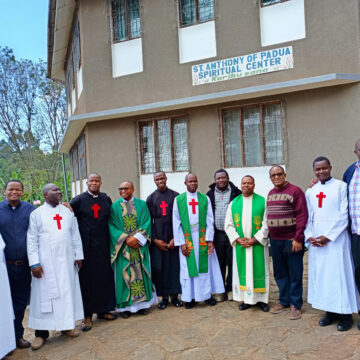
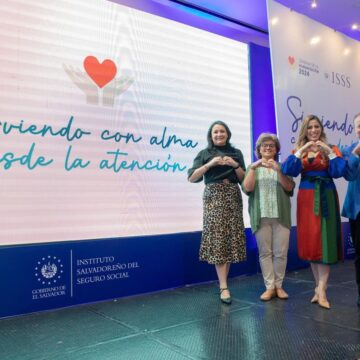
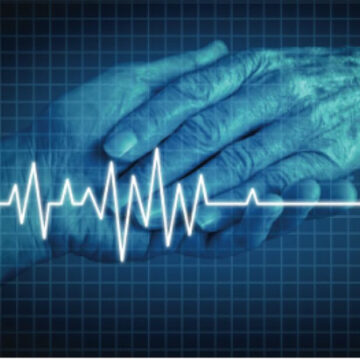
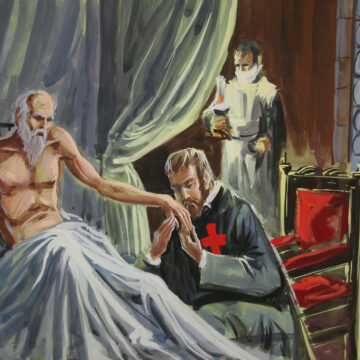
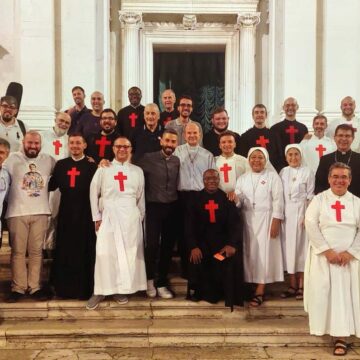
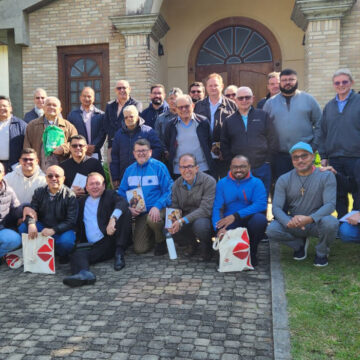
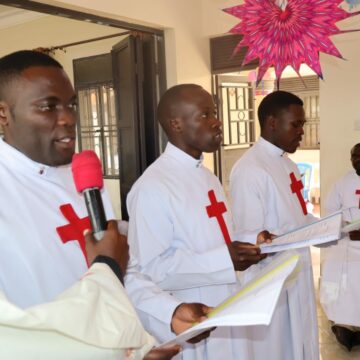
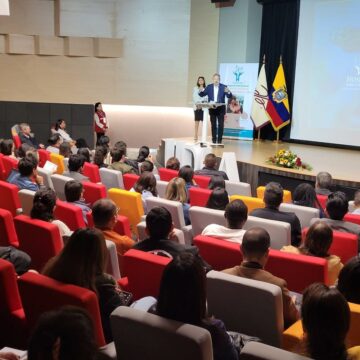
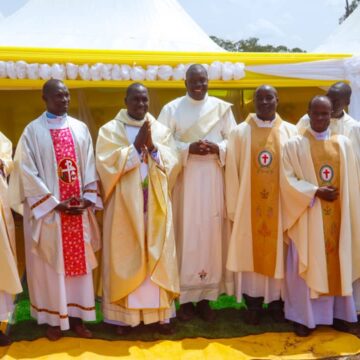

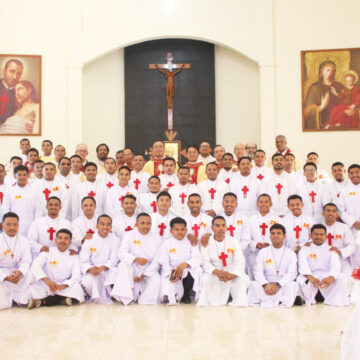
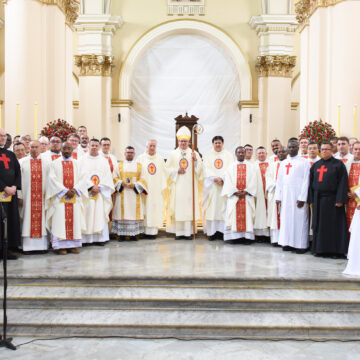
Camillians on Facebook
Camillians on Twitter
Camillians on Instagram